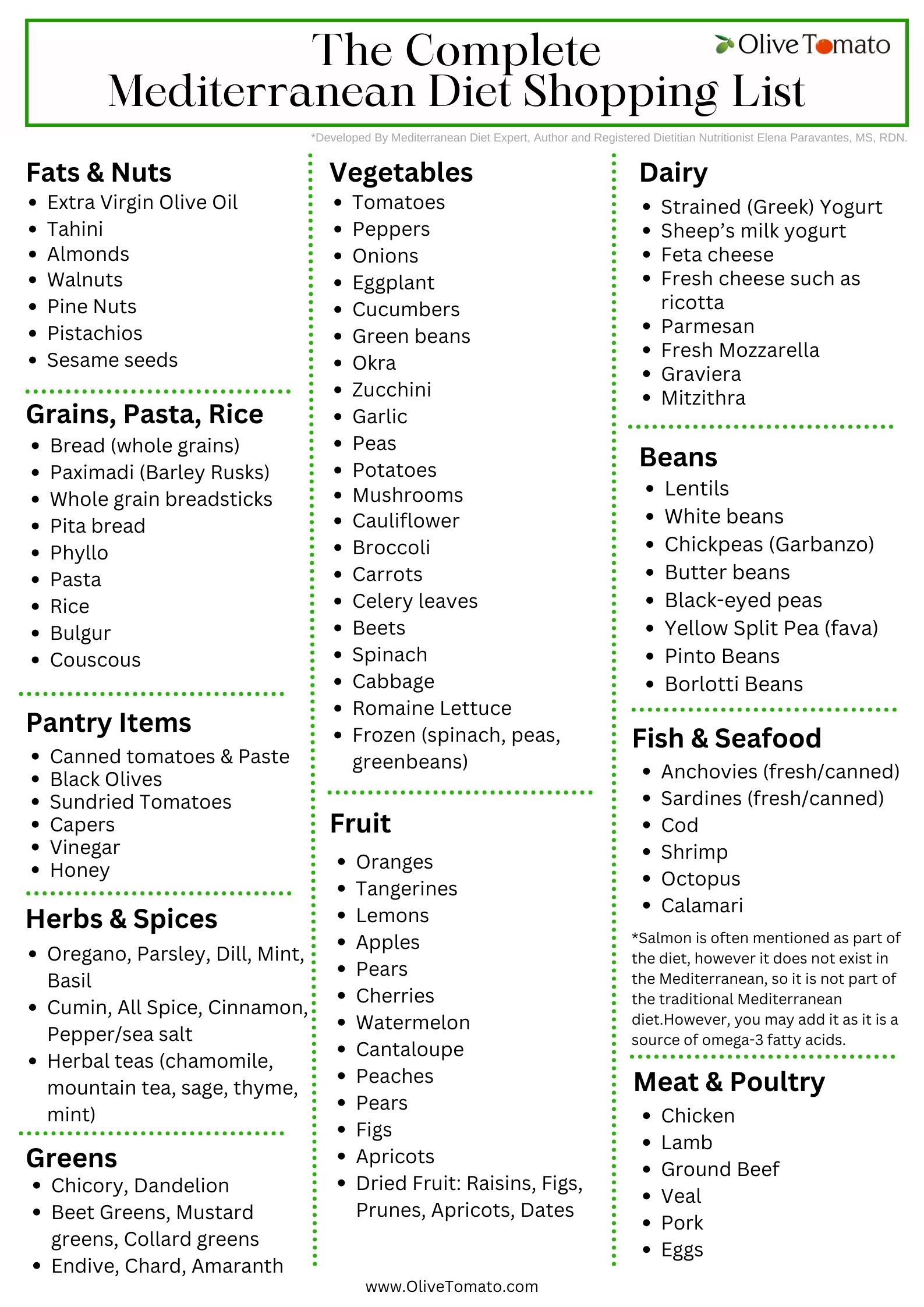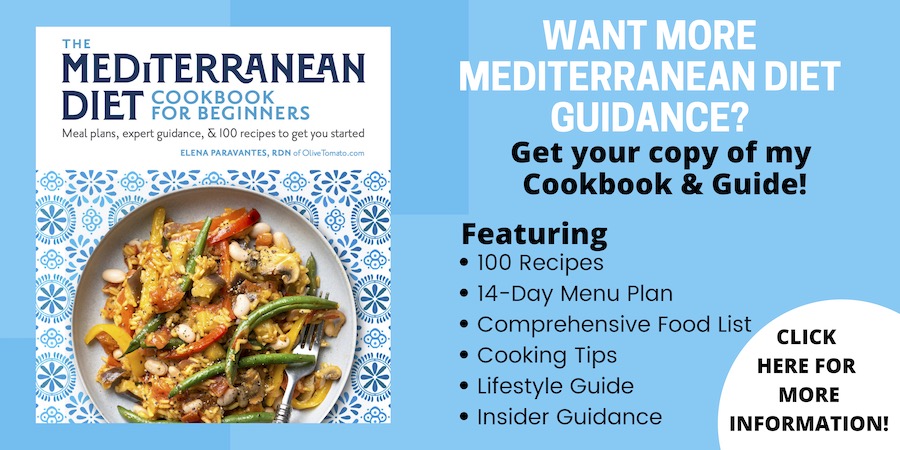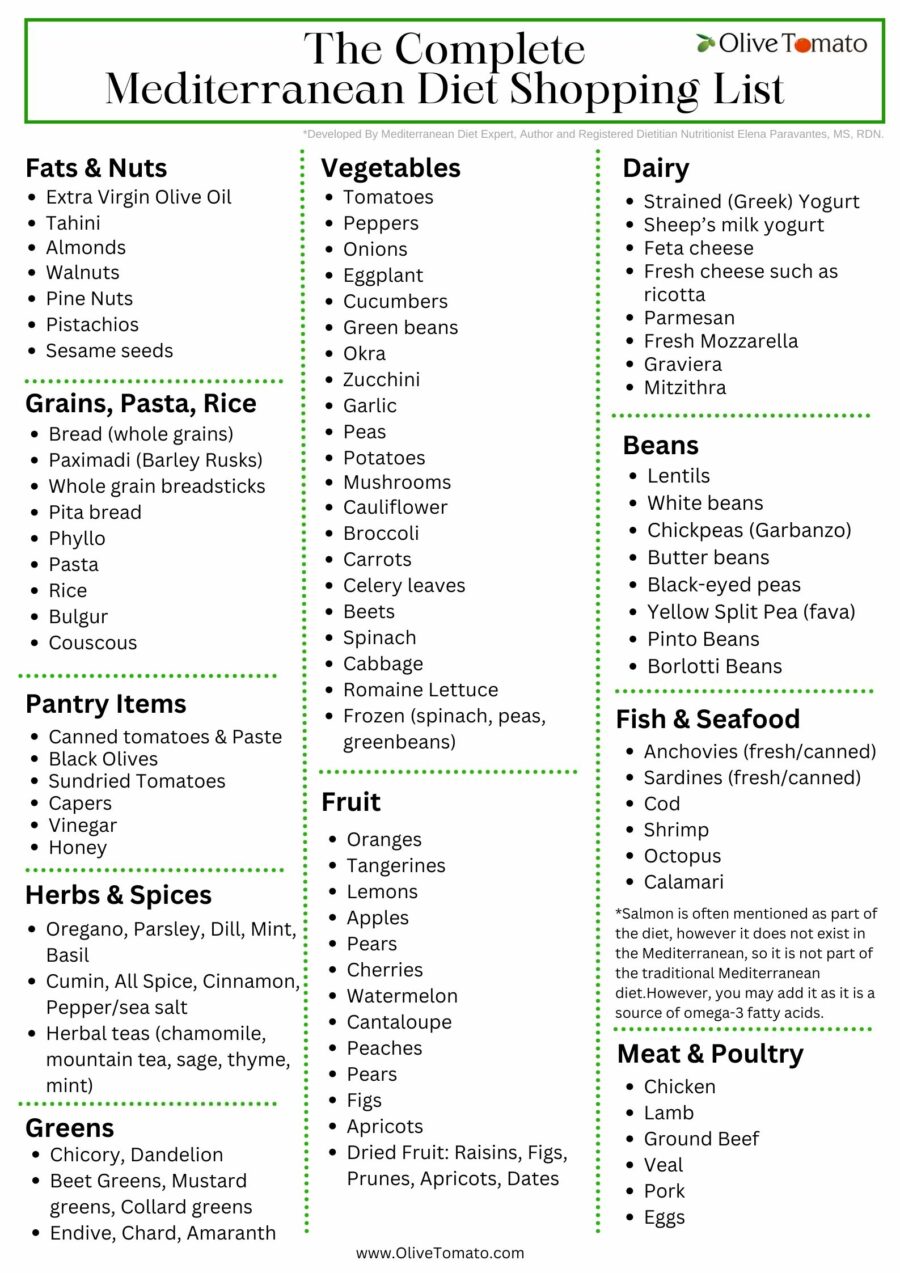The Complete Mediterranean Diet Shopping List
Following Authentic Mediterranean Diet is easy when you have the right tools! I’m making it even easier with an expansive collection of authentic Mediterranean Recipes that are easy and approachable and this free Complete Mediterranean Diet Shopping list! And you can also check out The Authentic Mediterranean Diet Meal Plan for ideas on how to follow a Mediterranean Diet. By Mediterranean Diet Expert, Author and Registered Dietitian Nutritionist Elena Paravantes RDN.

Table of Contents
Mediterranean Diet Basics
The Mediterranean diet generally is not based on rare or exotic foods, nor is it about complex recipes. Most ingredients are easy to find. The original version, particularly the Greek diet which was the prototype of this now popular eating pattern, is based on simplicity. This is a plant based diet with the key components being vegetables and olive oil. Many of you have requested this Mediterranean Diet food list and here I present you with a free list with all the foods that can help you follow an authentic Mediterranean diet. I suggest you click here to print the free Complete Mediterranean Diet Shopping list and actually make a few copies and have one on the refrigerator and one in your wallet, so that you can always have a quick guide.
- This way of eating is characterized by a high intake of vegetables, often consumed as a main course, meat is consumed a few times a month and extra virgin olive oil is used generously particularly in vegetable dishes.
- Other plant foods that will supplement your diet will include fruit, nuts and seeds.
- A Mediterranean diet does not depend much on packaged foods.
- Local and seasonal food is preferred.
- Extra virgin olive is the main source of fat in the diet, not other oils. It is used for all roasting, frying and sautéing.
- Dairy will include mainly yogurt and cheese.
- Fish and poultry are consumed moderately 1-2 times a week.
- Beverages are mainly water, wine (with food), coffee, tea and herbal beverages.
- Red meat including pork is consumed about once a week.
What is the Mediterranean Diet?
The Mediterranean Diet is an eating pattern and lifestyle that was observed in certain areas of the Mediterranean at a certain time and this eating pattern was associated with longevity . The Mediterranean diet has multiple health benefits including protection from heart disease, diabetes and certain types of cancer. It also appears to protect from Alzheimer’s disease, improves mood and helps maintain a healthy weight, and aid in weight loss. I say certain areas because the initial guidelines were based on research and information gathered on the typical diet of Crete, much of the rest of Greece, and southern Italy in the early 1960s. Therefore, it is important to clarify that this is not a diet that reflects the eating pattern of the whole Mediterranean region as is often mistakenly described.
The list is based on a traditional Greek Mediterranean diet mostly which is the prototype of the Mediterranean Diet. Some unique aspects include the consumption of greens (horta), mainly small fish, and of course the importance of herbs not only for cooking, but for drinking. Herbal drinks are consumed very often and there has been ongoing research on the benefits of drinking these beverages.
What to Eat – The Complete Mediterranean Diet Food List
It is important to note that a Mediterranean diet is also a sustainable diet, that means low on meat and going local and seasonal as much as possible. I am quite surprised when I see so-called Mediterranean recipes and almost all of them are composed of some sort of meat with vegetables on the side. That is not a typical Mediterranean meal, a typical Mediterranean meal is mainly vegetables and in most cases no meat, except for celebratory meals. Low on meat means good for the earth.
Another important aspect is the local and seasonal aspect. Try and consume vegetables, fruit and fish that are produced or grown as close to you as possible.
Below, I go through all the food groups followed by a Mediterranean Diet Food List you can get for free:
-Vegetables-
The key here is to be seasonal and as local as possible. No need to buy imported artichokes for example. What is more important is the method they are cooked and how they are consumed: cooked in olive oil and tomato usually, and consumed as a main course. I do recommend having on hand some frozen vegetables such as peas, spinach (for a quick spanakopita) and green beans when you cannot access fresh produce.
- Tomatoes
- Peppers
- Onions
- Eggplant
- Cucumbers
- Green beans
- Okra
- Zucchini
- Garlic
- Peas
- Potatoes
- Mushrooms
- Cauliflower
- Broccoli
- Carrots
- Celery leaves
- Beets
- Spinach
- Cabbage
- Romaine Lettuce
- Frozen (spinach, peas, green
- beans)
-Fruit-
Same concept, local and seasonal. It should be noted that Greeks consume more citrus in the winter which are an important source of antioxidants.
- Oranges
- Tangerines
- Lemons
- Apples
- Pears
- Cherries
- Watermelon
- Cantaloupe
- Peaches
- Pears
- Figs
- Apricots
- Dried Fruit: Raisins, Figs, Prunes, Apricots, Dates
-Dairy-
Main sources of dairy is cheese and yogurt. I did not include milk in this list, but if you consume it add it to your list. It should be noted that dairy consumed within a Mediterranean diet is not low fat.
- Strained (Greek) Yogurt
- Sheep’s milk yogurt
- Feta cheese
- Fresh cheese such as ricotta
- Parmesan
- Fresh Mozzarella
- Graviera
- Mitzithra
Meat and Poultry
Red meat is generally consumed once a week and chicken once a week. Meat is not the main attraction in any meal, unless it is a holiday or celebration. Common meat dishes include beef patties with herbs, chicken cooked in tomato, roasted chicken or roasted lamb.
- Chicken (whole, legs etc.)
- Ground Beef
- Veal
- Pork
Eggs
Eggs play such an important role in the Mediterranean diet. As the diet had very little meat, eggs were a good form of protein and were consumed as a main meal. Eggs are generally consumed as an evening meal or even for lunch accompanied with a salad. Usually as an omelette and sometimes fried in olive oil.
Fish and Seafood
The fish is mainly small and fatty. But remember even in Greece in the mountainous areas, fish was not necessarily consumed fresh, but mostly in a cured form. So you can go ahead and use canned sardines and anchovies.
- Anchovies (fresh or canned)
- Sardines (fresh or canned)
- Cod
- Shrimp
- Octopus
- Calamari
Grains, Bread, Pasta, Rice
The Mediterranean diet is not a high carbohydrate diet, in fact nutrition analysis show that only 40% of calories come from carbs. They most common carb is bread. Bread accompanies all the vegetable dishes. Once a week there will be a dish with pasta, and rice is often mixed with vegetables such as in spinach rice or leek rice.
- Bread (preferable whole grains)
- Paximadi (Barley Rusks)-Get recipe>> Authentic Greek Barley Rusks
- Whole grain breadsticks
- Pita bread- Get Recipe>>Best Homemade Pita Bread
- Phyllo
- Pasta
- Rice
- Egg pasta
- Bulgur
- Couscous
Fats and nuts
As noted olive oil is your main source of fat, you use it for cooking, baking and sautéing. Try and find the freshest extra virgin olive oil you can get your hands on. Get some tips here for buying olive oil.
- Extra Virgin Olive Oil
- Tahini
- Almonds
- Walnuts
- Pine Nuts
- Pistachios
- Sesame seeds
Beans
Beans play an important role in the Mediterranean diet. We eat them about twice a week. In Greece we use mostly dry, but canned can work for convenience.
- Lentils
- White beans
- Chickpeas (Garbanzo)
- Butter beans
- Black-eyed peas
- Yellow Split Pea (fava)
- Pinto Beans
- Borlotti Beans
Pantry Items
Items that are not on the other list will go here. One of my most used pantry items are canned tomatoes that I use when making all those vegetable dishes on the winter.
- Canned tomatoes
- Tomato Paste
- Olives
- Sundried Tomatoes
- Capers
- Balsamic/red wine vinegar
- Honey
- Wine
Herbs and Spices
Greek cuisine is mostly a cuisine of herbs, and there a few spices that are used such as cinnamon sticks, all spice and occasionally cumin. Herbs are also used in beverages, and play an important in the health benefits of the diet.
- Oregano
- Parsley
- Dill
- Mint
- Basil
- Cumin
- All Spice
- Cinnamon
- Pepper/sea salt
- Herbal teas (chamomile, mountain tea, sage, thyme, mint)
Greens
This is another aspect of the diet that is important nutritionally. Try and include various greens in your diet. In Greece we lightly boil them and serve them with olive oil and lemon. Or you can make a pita (hortopita) with them.
- Chicory
- Dandelion
- Beet Greens
- Mustard greens
- Collard greens
- Endive
- Chard
- Amaranth
What to Drink
- Your main go-to beverage is water.
- Consume wine only with meals.
- Drink herbal beverages as they are an important part of the diet. They are great source of antioxidants and also a source of hydration. Herbal beverages such as chamomile, thyme, sage and linden are drank often and have been associated with health benefits.
- Coffee is also consumed once or twice a day.
Foods to Avoid on The Mediterranean Diet
- Vegetable and seed oils such as corn oil and canola oil. While these oils may promote themselves as heart healthy they do not contain any antioxidants. Extra Virgin Olive oil is a source of a multitude of protective antioxidants.
- “Mediterranean” processed snack foods. Many companies sell snack foods such as chips, breakfast bars that may contain some ingredient that may be associated with the Mediterranean diet, however they are highly processed and often full of added sugars or vegetable oils.
- Soft drinks and other sweetened beverages. They do not even exist in the Mediterranean Diet.
- Flavored yogurts. Yogurt should only contain milk and yogurt cultures, no corn starch, gelatin, added sugars, artificial flavors.
- Ready Made Salad Dressings. Apart from the fact that many are made with unhealthy vegetable oils, even the ones containing olive oil have lost most of their nutrients (especially antioxidants) when sitting in a bottle .
4 Tips How to Start a Mediterranean Diet
So now that you have a bit of information on the background and basics of the diet, it is time to start. Luckily this diet is easy to follow and delicious, so it will not be too hard to get started. Here are some small changes you can make today:
- Eat meat as a side dish. Red meat is limited to one serving a week, but if it’s hard to do that, how about trying to have red meat as a side, rather than a main course? You can eat red meat two times a week in this way, an example would be a vegetable casserole with 2 ounces of meat on the side.
- Use olive oil as your main source of fat and the right amount. Olive oil is the basis of the diet and many of the benefits appear to come from the good monounsaturated fats but also the polyphenols in the olive oil. However to get the benefits, you must replace other fats with olive oil, it should your main source of fat in your diet and you should make sure you are using it correctly.
- Keep cooking simple. A mistake a lot of people make when they start a Mediterranean diet is finding various “Mediterranean” complex recipes that require numerous and special or exotic ingredients, long preparation or recipes with foods that they don’t usually eat. Traditional Mediterranean recipes are usually easy and simple to make with real, seasonal ingredients that you most likely have on hand. Three starter recipes I recommend are: Greek Spinach and Rice, Traditional Green Bean casserole and One-Pot Black-Eyed Peas.
- Make an effort to eat fish (canned is OK). Most of us just don’t get enough fish in their diet. If you find fresh that’s fine, but canned, marinated and cured fish is good too, as well as frozen. It is preferable that you consume small fatty fish such as anchovies and sardines.

Mediterranean Diet Recipes
Check our expansive collection of authentic Mediterranean Diet Recipes by heading over to our Recipe Index. And if you want even more recipes and a Mediterranean Diet Guide that includes a 14-Day Menu, Lifestyle Tips then you will love my book! Check out The Mediterranean Diet Cookbook for Beginners.
SAVE IT FOR LATER AND PIN IT

References
Hellenic Ministry of Health and Welfare, Supreme Scientific Health Council. Dietary Guidelines for adults in Greece. Archives of Hellenic Medicine. 1999;16(5):516-524.
Keys A, Aravanis C, Blackburn H, Buzina R, Djordjevic BS, Dontas AS, Fidanza F, Karvonen MJ, Kimura N, Menotti A, Mohacek I, Nedeljkovic S, Puddu V, Punsar S, Taylor HL, Van Buchem FSP. Seven Countries. A Multivariate Analysis of Death and Coronary Heart Disease. Cambridge, MA and London: Harvard University Press; 1980.
Willett WC, Sacks F, Trichopoulou A, Drescher G, Ferro-Luzzi A, Helsing E, Trichopoulos D. Mediterranean diet pyramid: a cultural model for healthy eating. Am J Clin Nutr. 1995 Jun;61(6 Suppl):1402S-1406S.

God bless DR Alabi for his marvelous work in my life, I was diagnosed of HERPES VIRUS since 2019 and I was taking my medications, I wasn’t satisfied i needed to get the HERPES out of my system, I searched about some possible cure for HERPES i saw a comment about DR Alabi how he cured HERPES with his herbal medicine, I contacted him and he guided me. I asked for solutions, he started the remedy for my health, he sent me the medicine through UPS SPEED POST. I took the medicine as instructed, in 2 weeks i was totally cured. if you need herbal cure contact DR Alabi on his WhatsAPP number: +2348161676526 because he has a solution to all your problems.
Where do I find the 5 day meal plan?
Excellent guide! The detailed food list and 5-day menu plan make starting the Mediterranean Diet easy. Thanks for sharing!
Why is turkey NOT LISTED as a meat option?
Because turkey don’t live outside the America’s, unless you’re talking about the people….
I got your book yesterday, it is awesome and inspiring!
I do have a question however: you suggest 4 to 7 servings of grains and bread per week, however in the 2-week menu, there is several more servings of carbs (ex day 5). Can you please clarify what is your actual recommendation?
Thanks
I need help suggestions. I am allergic to eggs, shellfish, nuts and tomatoes. Can I still sustainabily follow a Mediterranean food lifestyle? I noticed you said eggs are big in their diet and w my egg allergy I can’t do that. 🙁 Please help. Thank you!
I detest anchovies and sardines. Can I use salmon and Tuna instead?
Wheres the olives at?
Under Pantry Items
Can you have salmon and tuna
I purchased your book last summer. I’ve done a lot of research on the Mediterranean diet, Mediterranean dash diet, and plant-based diet. Actually, the Mediterranean diet is a lifestyle. I’m living with my 91 year old mom who’s legally deaf with a cochlear implant. She takes Warfarin, so she can’t have any foods containing vitamin K meaning greens and salads are out. Suggestions?
Talk to her Dr. There are alternatives to Warfarin. I take Apixaban now and can eat all the greens I need!
There are some reasons why a person must take warfarin, having a mechanical heart valve for example. Warfarin is the only blood thinner in that case. But, what I’ve learned is that vitamin K foods are NOT off the table. You can still eat them, but the amount consumed has to be consistent in order for the warfarin dose to be adjusted for the amount of vitamin k ingested in the diet that offsets it.